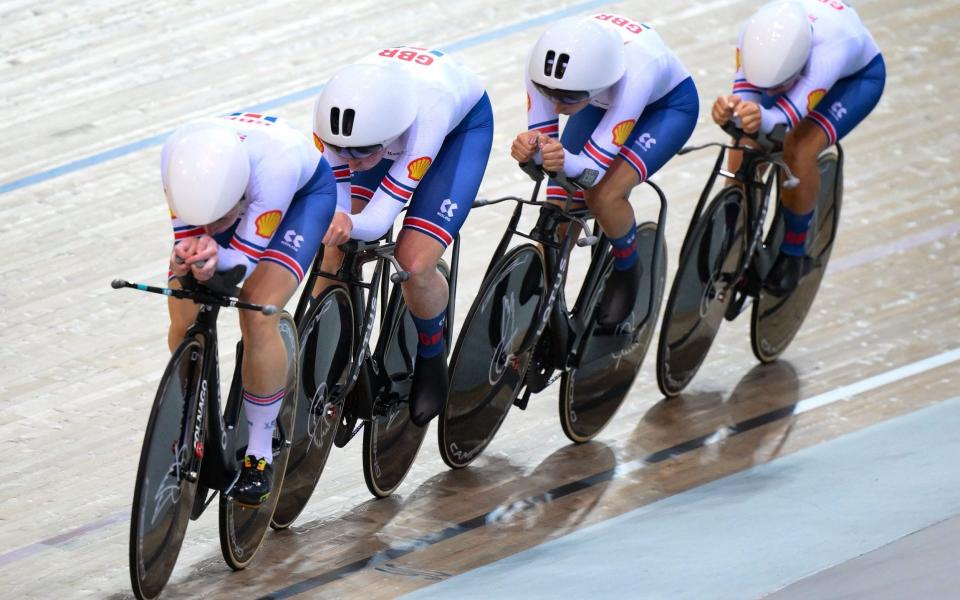British Cycling chief resigns after fierce backlash to Shell sponsorship deal and trans row

British Cycling has announced the sudden departure of its chief executive following the furious backlash against its “brazen sportswashing” partnership with Shell.
The governing body confirmed Brian Facer was to step down “with immediate effect” less than two years into the job and just three weeks after his enthusiastic unveiling of its controversial new eight-year deal with the oil giants.
His exit also comes six weeks after British Cycling was forced to apologise for telling people not to ride their bikes during Queen Elizabeth II’s funeral and six months after it had to suspend its transgender policy amid a major row over Emily Bridges’ bid to switch from riding in men’s races.
That policy was published prior to Facer’s arrival from London Irish but it was impossible not to link his departure to a deal with Shell to which Telegraph Sport has been told the governing body’s board nevertheless remains committed.
In a terse statement announcing his exit, the commencement of the hunt for a new chief executive and the appointment of director Danielle Every as acting CEO, chairman Frank Slevin said: “We remain fully committed to the delivery of our ‘Lead our sport, inspire our communities’ strategy, as we continue our work to support and grow our sport and wider activities, and provide our Great Britain Cycling Team riders with the best possible platform for success.
“Our new CEO will join the organisation at an exciting time as we build towards next year’s inaugural UCI Cycling World Championships in Scotland, and the Paris Olympic and Paralympic Games in 2024.”
Unveiling the Shell deal earlier this month, Facer said: “We’re looking forward to working alongside Shell UK over the rest of this decade to widen access to the sport, support our elite riders and help our organisation and sport take important steps towards net zero – things we know our members are incredibly passionate about.”

The backlash was immediate and intense, with social media networks seeing people threatening to cancel their membership of the governing body, ridiculing Facer’s claims and questioning whether it was April Fool’s Day.
Environmental groups Greenpeace and Friends of the Earth condemned the partnership as “brazen sportswashing”.
“The idea of Shell helping British Cycling reach net zero is as absurd as beef farmers advising lettuce farmers on how to go vegan,” the Greenpeace UK policy director, Dr Doug Parr said. “After being booted out of museums and other cultural institutions, Big Oil is looking at sports as the next frontier for their brazen greenwash. But their aim hasn’t changed – to distract from the inconvenient fact that the fossil fuel industry is making our planet uninhabitable.”
Callum Skinner, the Rio 2016 track sprinter who won gold in the team event and silver in the individual, posted on Twitter: “Well that’s gone as well as could be expected, glad I don’t have to pedal their messaging anymore.
“BTW the athletes aren’t allowed to speak out or not do appearances, be nice.”
Given it would have expected a backlash, the Shell deal was almost certainly a sign of just how desperate British Cycling is for commercial income to supplement its UK Sport and Sport England funding.
The governing body was left with an estimated £30million funding hole for this Olympic cycle after HSBC UK decided to trigger a break clause in its own eight-year sponsorship deal at the end of 2020. That break was extended by a year due to Covid and the Tokyo 2020 postponement, but the money ran out at the end of 2021.
British Cycling is also contending with falling membership. That is despite claims last year that it would grow membership by 100,000 by Paris 2024.
The Shell deal is thought to be worth between £1m-£2m per year, roughly what Sky used to pay 10 years ago. Sky would, however, provide lots of Value in Kind in marketing support for Sky Rides. The HSBC deal was worth up to £8 million per year.
The governing body is still seeking a lead partner.

